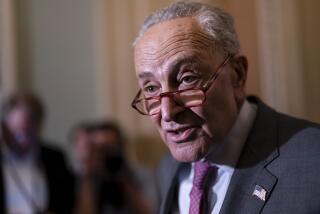NEWS ANALYSIS : Clinton’s Fortunes May Rise or Fall on Filibuster : Senate: Lawmakers say if GOP can block President’s stimulus plan, the rest of his policy agenda may also fail.
- Share via
WASHINGTON — Outwardly, the Republican filibuster that has stymied President Clinton’s $16.3-billion economic stimulus package may look like the kind of congressional bickering most voters long ago learned to ignore.
Beneath the surface, however, it is turning into the first major test of whether Clinton has the presidential strength and leadership skills to turn his wide-ranging policy agenda into reality.
As a campaigner, Clinton long ago proved himself a master at winning over ordinary voters, successfully playing the role of an earnest outsider determined to change a cynical system and using television in innovative ways to go over the heads of those who would oppose him.
Now, as President, he faces a different challenge: the insiders’ test of hand-to-hand combat with an intractable opposition that is hard to bulldoze and cannot be charmed with high rhetoric. If Clinton does not find a way to overcome or compromise with the Republican minority on the stimulus package, lawmakers and analysts say, he faces the prospect of seeing this same drama played out over and over again on more critical votes on health care, tax increases and spending cuts.
If the Republicans prevail on the stimulus issue, “it just means the President’s whole program is going to go down,” said Sen. Dale Bumpers (D-Ark.), one of Clinton’s closest allies in Congress.
The stimulus proposals, which Clinton says will give the economy a needed lift and his opponents portray as a warmed-over version of the liberals’ old tax-and-spend game, is relatively small potatoes in the $1.5-trillion federal budget.
But Senate Republicans and some conservative Democrats are convinced that Clinton is politically vulnerable because the plan proposes new spending at a time when the President has promised to cut the deficit. Using legislative guerrilla tactics, they have blocked action on the package itself and hope to use the issue as a vehicle for seizing control of the overall debate on America’s economic future.
For a week, Republicans tied up the Senate with a filibuster that the Democrats could not muster enough votes to break. “The public has got this figured out,” boasted Sen. Trent Lott, (R-Miss.), a leader of the Republican blockade. “They feel like this is just a spending bill.”
After initially giving no ground, Clinton indicated Tuesday that he is ready to consider a deal. At the same time, he renewed his threat to attack the GOP as perpetuators of gridlock and obstacles to progress on the nation’s economic problems.
Speaking only hours after the Senate broke for its Easter recess without ending the filibuster, Clinton declared at a press conference:
“I’m going to work on an amended proposal and I think we’ll address some of the legitimate expressed objections. . . . We’ll see when Congress comes back whether Republicans are committed to putting the American people back to work or playing politics.”
Clinton enjoys a heavy Democratic majority in the House, where anything can be accomplished with the support of 50% plus one. In the Senate, Clinton is three Democrats short of the 60 votes he needs to cut off a filibuster.
That incontrovertible reality is something Clinton apparently has just begun to understand. “A compromise was sort of inevitable. . . . It’s a tough way to learn the rules about 60 votes for cloture,” conservative Democratic Sen. J. Bennett Johnston of Louisiana said.
The bruising fight over the stimulus package marks an unprecedented act of defiance by the minority party at the outset of a new Administration. It also represents a dramatic change in the legislative climate for Clinton.
Early on, Clinton made a show of consultation with the Republicans in a series of highly publicized visits with their members on Capitol Hill. And only two weeks ago, the passage of his spending blueprint was hailed as a demonstration of a new unity and strength on the part of the President and his party in Congress.
The budget resolution did not require Congress to take tough votes on specific spending cuts and tax hikes, however. And before the final vote, Democrats denied the Republicans even a single victory, beating back dozens of politically popular GOP-backed amendments.
In retrospect, Clinton’s refusal to deal with the Republicans looks like it may have been a miscalculation that enraged and emboldened the opposition to pick a fight on the stimulus legislation.
The stimulus package proved an easy target--in part, analysts argue, because Clinton has done a poor job of laying out his arguments for it, leaving it vulnerable to Republican charges that it is old-fashioned pork.
Intent on convincing both the public and the nation’s financial markets that his Administration is serious about deficit reduction, Clinton has kept the public focus on his proposals to raise taxes and cut spending. But in reality, his agenda is not so single-minded as that and Clinton’s failure to offer a more complete justification for his rather complex goals of tax hikes, spending cuts and spending increases has given Republicans an opening.
“Republicans are starting to find the threads that they can unravel,” said Kevin Phillips, a Washington political analyst.
With the stimulus, Phillips added, “the Administration took a win-win-win situation and turned it into a lose-lose-lose situation. They never made the case for the stimulus, because they were so concerned about the bond market and showing that they were serious about the deficit. And now they have let the Republicans convince people the stimulus just means building swimming pools.
“So the end result will be that, while you have significant parts of the country still in recession, including California, Illinois and the Northeast, Clinton will not get a stimulus, and it will look like he offered a hack Democratic bill that deserved to lose.”
Efforts to cut off the filibuster have produced a series of conspicuous and embarrassing defeats. On Monday, when the Democratic leadership made its third try, 22 senators did not even bother to show up for the vote.
Many Senate Democrats privately give Clinton low marks for failing to take the lead in a counteroffensive against the Republicans. With the President preoccupied in recent days by his first summit with Russian President Boris N. Yeltsin and the illness of his father-in-law, Hugh Rodham, Senate Majority Leader George J. Mitchell (D-Me.) assumed command on the Hill.
White House Budget Director Leon E. Panetta and Treasury Secretary Lloyd Bentsen, both veterans of Congress, entered into negotiations with the opposition late Monday but could not broker a deal.
The Republican strategy “is a kind of blackmail and, of course, if they succeed in this, it is going to be done again and again and again,” complained Appropriations Committee Chairman Robert C. Byrd (D-W.Va.), a former majority leader. “The American people thought we were through with gridlock.”
The situation had deteriorated to the point that even Sen. John H. Chafee (R-R.I.), a moderate upon whose support the Democrats often can count, took to the Senate floor Monday to accuse the Administration of “hubris--an overbearing pride.”
“Arrogance will not succeed. Consultation will,” Chafee added. “If this President is to wrestle successfully with a number of contentious issues, it’s essential that he have Republican support.”
Clinton still has at hand his most formidable weapon--his considerable abilities in political salesmanship. During the two-week interval before the next vote, Clinton “will be making his views known,” Mitchell predicted.
But he has to come up with something stronger than a mere expression of views, said Thomas E. Mann, director of governmental studies at the Brookings Institution. “Given the unprecedented nature (of the GOP filibuster), Clinton ought to be making them pay a price for it,” Mann said.
“So far, nothing that’s been occurring in the Senate has resonated with the public and that puts the Republicans in the driver’s seat.”
At the same time, Mann said, Clinton should be reaching a quiet rapprochement with some of the moderate Republicans, such as Chafee, whose support will be critical in the future.
It can be done, as Ronald Reagan demonstrated in 1981. Even though he did not share Clinton’s advantage of having a majority of both houses on his side, Reagan was able to enact his economic program by peeling conservative Democrats, the so-called Boll Weevils, away from their party leadership.
“We fought the first one real hard, because we realized that if they won the first one, we’d have a hard time on all the rest,” recalled Tony Coelho, the former California congressman from Merced who was a member of the House Democratic leadership.
“We lost, and we were right,” he added. “In 1981 and 1982, it was nearly impossible for us to beat Reagan and the Boll Weevils.”
If Clinton can duplicate Reagan’s feat, he may rewrite the book on U.S. economic and social policy, as he has pledged to do. If he fails in the looming contest of political infighting, he may instead share the fate of Jimmy Carter, the last Democrat to occupy the White House. Carter lost his reelection bid when voters lost faith in him.
Times staff writer William J. Eaton contributed to this story.
More to Read
Get the L.A. Times Politics newsletter
Deeply reported insights into legislation, politics and policy from Sacramento, Washington and beyond. In your inbox twice per week.
You may occasionally receive promotional content from the Los Angeles Times.










